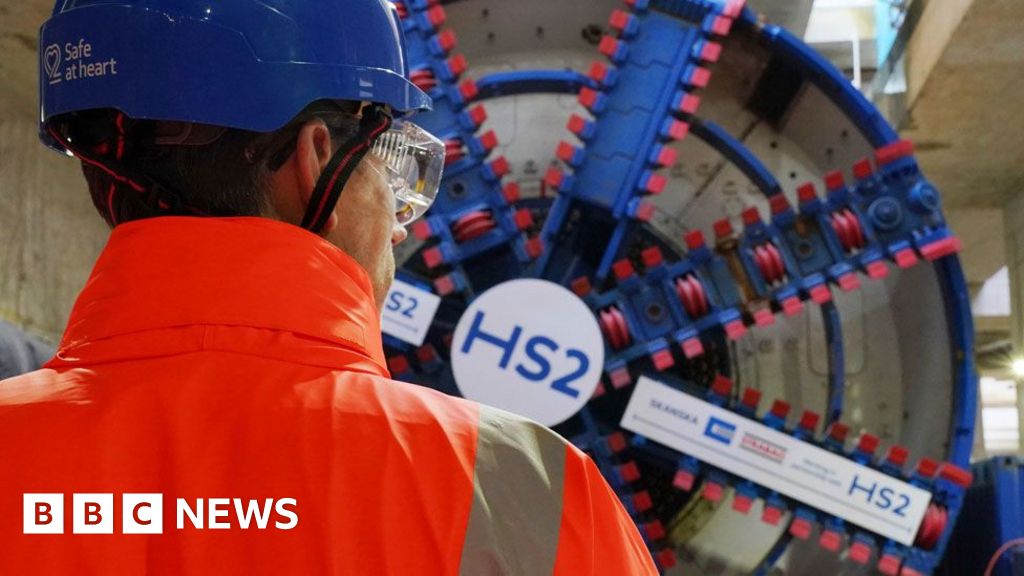The government confirmed that the opening of HS2 will be delayed beyond its target date for 2033, but it was unclear when the high-speed rail lines would start operating.
Transport Secretary Heidi Alexander on Wednesday described the HS2 project as “a appalling mess,” saying there was “no route” to deliver the line on schedule and within budget.
She said that “Rittany of Failure” had risen by £37 billion by the time HS2 was approved in 2012 and last year.
This is the latest setback in the high-speed rail project, reduced and repeatedly delayed.
Announcement of the delay in the House of Representatives, Alexander said:
“Billions of pounds of taxpayer money is wasted by constant scope changes, ineffective contracts and bad management.”
She said she will provide an update on costs and deadlines by the end of the year.
Many conservative governments have made the main side about rising costs for HS2.
Shadow Transport Secretary Gareth Bacon admitted that “an error occurred in the delivery of the HS2.”
He said “more than doubled” and “projects are repeatedly delayed.”
Bacon said the changes announced in 2023 under then Prime Minister Rishi Snack were the result of the failed plans by the Conservative government.
They included scrapping plans to build an HS2 line between Birmingham and Manchester.
Alexander said the two reports to the project were intended to “draw a line in the sand” and to mark a reset on how the UK’s main infrastructure is delivered.
An interim report by Mark Wilde, CEO of HS2, appointed last year, “exposes shocking mismanagement of the project under previous government,” Alexander said.
She added: “Based on his advice, there is no route that the train can run by 2033.”
Wild’s preliminary report found that there was a “single root cause” of costs and delays at HS2 Ltd, and that there was a “single root cause” in the “accumulation” of problems over time.
He said there was a “lack of timely intervention to address known challenges setting the conditions for systematic disorders seen today.”
Wilde acknowledged that external factors have contributed to the difficulties, including the pandemic, Brexit and the Russian-Ukraine war.
However, there were other more persistent issues, he discovered.
Construction on the HS2 began “too early” without a stable design, Wild said. That is, he said that costs and scheduling do not take risks into consideration.
The organization itself is “unbalanced” and “too big” in some areas, such as corporate functions, he said. There is also a gap in the workforce, particularly those with commercial and technical skills.
A second report by senior infrastructure delivery specialist James Stewart examined the governance and accountability of HS2 Ltd. It showed what went wrong with the project and what the Minister could learn in future major projects.
Alexander has also confirmed the appointment of former London Department of Transport Mike Brown as the new chairman of HS2.
Under the original plan, HS2 was intended to create a high-speed rail link between the Midlands and the northern England London and major cities.
It is designed to reduce rail travel time and expand capacity, but has faced countless challenges and rising costs in the 16 years since it was first proposed.
The large construction project was given green light in 2012 and was expected to be open by 2026, costing £330 billion.
By 2013, the project’s costs had spiraled to almost £500 billion, with the expected completion date being pushed back to 2033.
In 2020, when Boris Johnson recommended the government to advance HS2, one independent estimate would result in a potential final cost of £106 billion.
In recent years, the scope of development has been reduced.
The eastern feet between Birmingham and Leeds were first xed before the government of Rishi Snack cancelled its planned Manchester route from Birmingham.
Last year, the Ministry of Transport said the remaining project costs were estimated at £45 billion to £540 billion at 2019 prices, while HS2’s management estimates it would be £57 billion.
